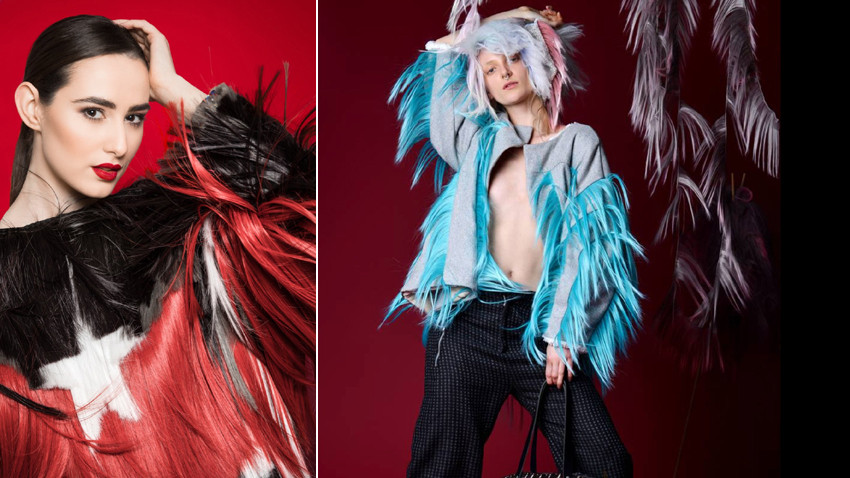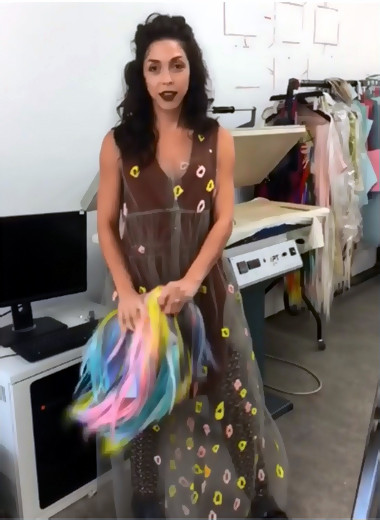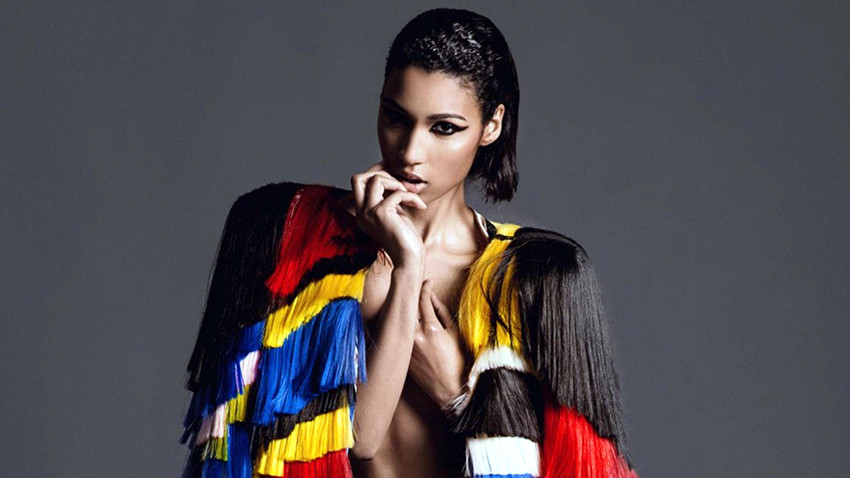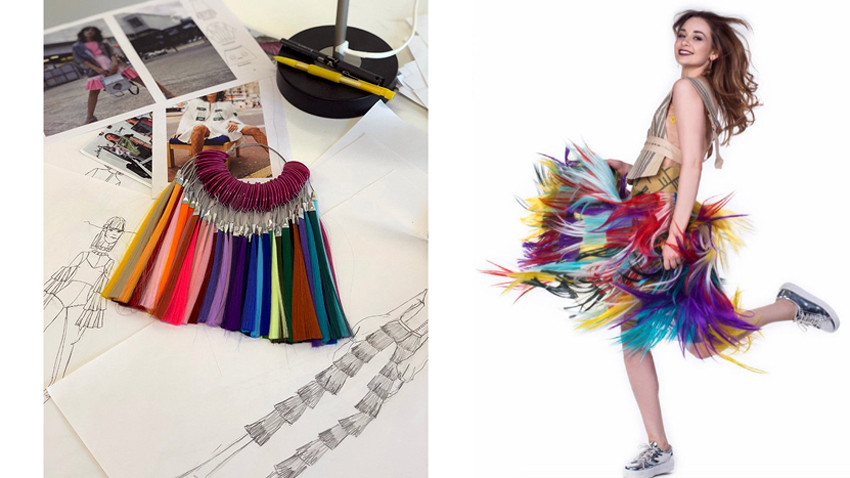On the catwalk, her fashion creations flutter and swirl in clouds of colour. And because they are made of dyed synthetic hair, they resemble live paintings that change their shape with the puff of the wind.
Bulgarian designer Krasimira Stoyneva first discovered hair as a material rich in expressive power in the art school in her native city of Plovdiv. But she did not put her wild fantasy to practice until years later when, already a fashion student at the University of East London, she had the task of experimenting with non-traditional fabrics and colours. That was the time when she came up with the idea of using synthetic hair instead of animal fluff, and her choice was received enthusiastically by the university professors. Thus, hair has turned into her signature style and gradually took her to prestigious fashion venues, including London’s Fashion Week.

“Drawing, trimming, curling – that’s how I do my designs“, says Krasimira Stoyneva. „Many people have used hair before, but the specific thing about me is that I paint on it, I make prints. The richness of colours allows me to always invent new and new things.”
Her creativity and freedom to take an untrodden path was first noticed during her university studies when Krasimira won the Vogue Magazine Award, the Musee X Vogue Talents - Young Vision Award. This high distinction opened many doors for her – she received a sponsorship for making a new collection, travelled to India and fashion capitals around the world.
 “The collection I impressed them with was my last collection as a university student and it was selected to open the fashion show of the university," Krasimira recalls. "And yes, hair has always been part of it because it's my way of creation. They liked the new combinations, the boldness in the choice of colours, the mixing of different materials, among which hand-woven items from Bulgaria. My collection was very rich in prints related to different peoples and ethnic groups from around the world – one big "hotch-potch". My inspiration for it came from London, which is oddly coloured by different people, cultures, and outlooks.”
“The collection I impressed them with was my last collection as a university student and it was selected to open the fashion show of the university," Krasimira recalls. "And yes, hair has always been part of it because it's my way of creation. They liked the new combinations, the boldness in the choice of colours, the mixing of different materials, among which hand-woven items from Bulgaria. My collection was very rich in prints related to different peoples and ethnic groups from around the world – one big "hotch-potch". My inspiration for it came from London, which is oddly coloured by different people, cultures, and outlooks.”
Among the diversity of this cosmopolitan city, the young designer met also her "Future Queens" for whom she created her first collection. “With her, I wanted to show that I am a brave girl who dares, desires, dreams, but that every woman can be a queen, as long as she works on it”, she says. The toilets are inspired by the singer Rihanna, whom she imagined wearing bright colours. And necessarily happy - because the ladies who dream of a crown are radiating rays of happiness and joy, just like her clothes.
“For a long time I wondered why I was so bright, so bold with the use of colours - because some of my outfits are not meant for anyone, nor can they be worn in everyday life," says Krasimira. "And I discovered that for a long time I had held in myself a voice that could not come out freely. In fact, my clothes help me express myself, they give me the courage to be bold.”

As bold as her dream – to set up a fashion empire that her three children would one day inherit. For the time being, the designer works on growing her brand in London where she teaches fashion at her former university and her garments are sold in the most elite boutiques. But she never stops thinking about Bulgaria because she wants to come home. And she’s always started to make the first steps on the path leading back to her roots, establishing contacts with Bulgarian factories which can manufacture her clothes. In the near future, she is about to teach at another London university, to participate again in the Fashion Week in the British capital, as well as travel to New York, Los Angeles...

“In my opinion, it is very important to find oneself and what one really loves doing”, the successful Bulgarian designer sums it up. “One needs to experiment, to look for new things and should never stop, because then you end up as a mediocre designer. Therefore, it is important to constantly delve into the unknown if you want to be a discoverer.”
English Rossitsa PetcovaPhotos: courtesy of Krasimira Stoyneva
On 25 January 1935, Tsar Boris III signed the decree establishing the Bulgarian National Radio. The document, which officially marked the beginning of "Radio Sofia", as the Bulgarian National Radio (BNR) was then called, made radio broadcasting in Bulgaria..
The Federation of European Carnival Cities has declared Pernik a global center of masquerade traditions. 16 years ago, Prenik was named the European Capital of Sourvakar and Mummer Traditions, and nearly 10 years ago, the Surva festival was..
Bulgaria ranks last among EU Member States in terms of life satisfaction. This is according to Eurostat data for 2023 published today . With an average level of the Community indicator of 7.3 points out of 10, Bulgaria scores 5.9. Finland tops the..
The Federation of European Carnival Cities has declared Pernik a global center of masquerade traditions. 16 years ago, Prenik was named the European..

+359 2 9336 661
